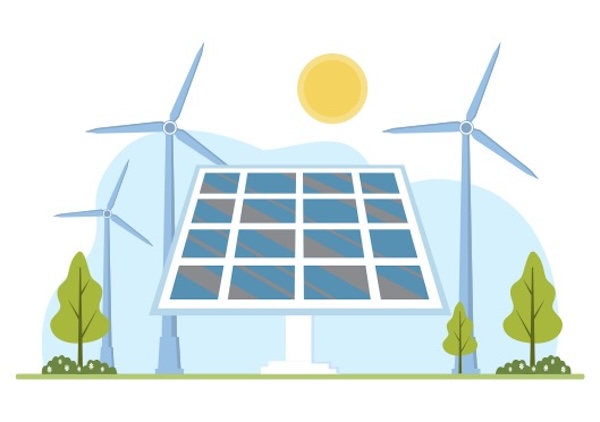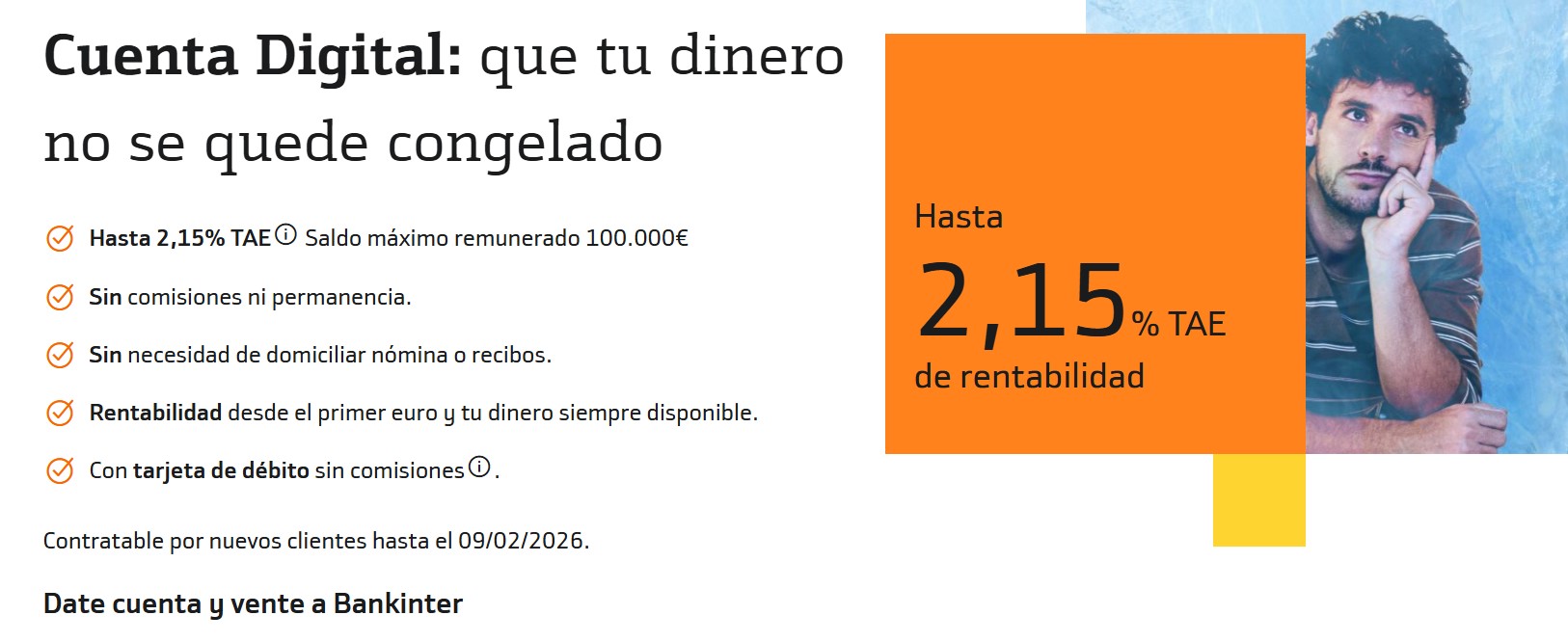The seminar combined the perspectives of finances and real estate thanks to the participation of the Esade Alumni Real Estate and the Finance Club, in conjunction with the Esade Real Estate Association and the Esade Students Finance Society
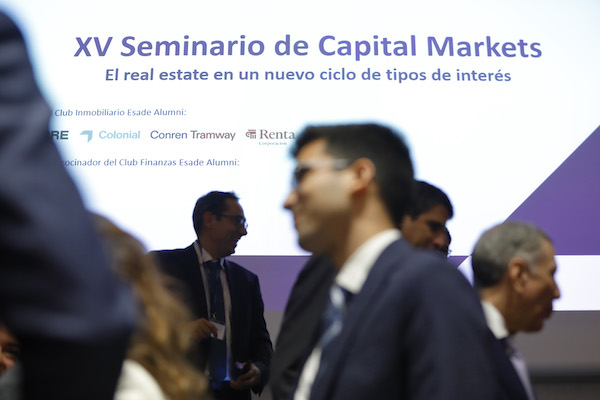
In order to analyze the rules of the game in the real estate sector in 2024, we have to understand where we’re coming from. Last year, 2023, was a year of weak economic growth in most of Europe, with high inflation rates and a strong cycle of increasing interest rates which have affected real estate investments. So what we can expect in 2024?
In the introduction to the session, Carmina Ganyet (VV 03), chair of the Esade Alumni Real Estate Club and member of the Executive Committee of the Urban Land Institute (ULI), stressed that the pandemic accelerated the consolidation of mega-trends and new product concepts: “The sector seemed to be regearing to support these trends, but the rise in interest rates has led investors to lose interest in real estate in favor of other types of assets. Now that we’re facing a new cycle, and even though we’re beginning to see the light, we think it’s important to reflect on what the return on real estate investment should be,” she said.
“Now that we’re facing a new cycle, and even though we’re beginning to see the light, we think it’s important to reflect on what the return on real estate investment should be”
To peer at the immediate future, the session continued with the micro-financial analysis offered by Adrià Morrón, Lead Economist at CaixaBank Research, who noted a shift in financial experts’ narrative since the stagflation that marked 2023, with hopes for a soft landing in 2024, even though geopolitics and financial tensions still pose a risk. “Inflation is what opens the door to downshifts in interest rates, even though this time it will be gradual due to both credibility issues and a peak employment rate, both of which advise caution,” Morrón stated. In this analyst’s opinion, both the European Central Bank (ECB) and the Federal Reserve will have made the first cut in interest rates by June 2024, although the ECB will not take rates outside the restrictive zone until 2025. So what about the long term? “The prospects are around 3% in the eurozone, although we don’t know how far we’ll go because the debate is still open,” he concluded.
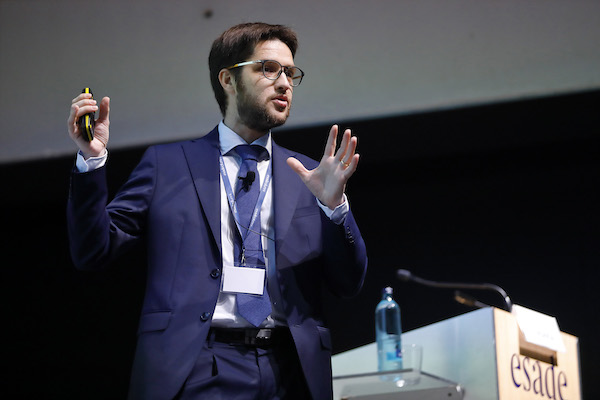
Jos Tromp, Head of Business Development for Continental Europe and Head of Continental Europe Research and Data Intelligence at CBRE, furthered the financial analysis with his view of the real estate market’s prospects for 2024. Tomp agreed that the risks revolve around geopolitical tensions and the persisting underlying inflation, although inflation will continue to drop throughout the year. In fact, the long-term interest rates began to decline in October, and further moderate decreases are predicted for 2024. Within this context, Tromp sees a better scene for real estate investment, even though the market is still recovering and the flow of operations will stabilize within the next two quarters. “Capital will flow back into the real estate market, so we can expect volumes of investment to increase around 10% over 2023, but they won’t grow much until the ecolonomy recovers,” he explained.
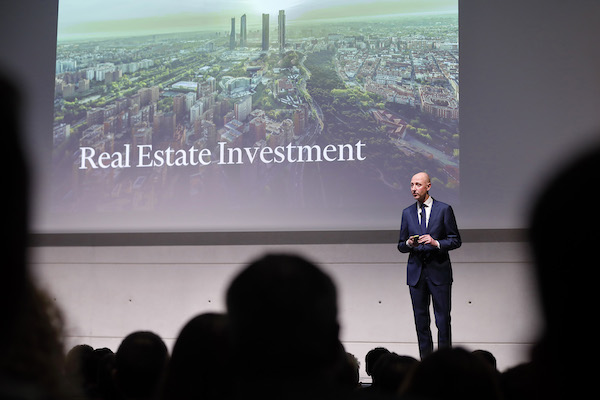
Investment prospects with the new interest rates
These analyses were complemented by a panel discussion featuring Jorge Alcover (Lic&MBA 98), Managing Director at Goldman Sachs; Alex Bujanda, Chief Investment Officer at Zurich for Spain and Portugal; and Alberto Nin, Managing Director of Brookfield Asset Management. The panel was moderated by Xavier Güell, Head of CBRE Barcelona, who stressed: “If we want to understand what’s happening in the real estate sector, we have to understand the entire capital market, because they are closely connected.” In Güell’s opinion, it is interesting to see how investment portfolios attempt to anticipate the changes that inevitably come. And the finance experts share his view:
Jorge Alcover (LIC&MBA 98): “The period 2014-2022 was abnormal. If someone invested in this cycle just to be opportunistic, they got burned because you have to keep the long term in sight. To me, the lesson we should learn from 2023 is that interest rate increases need our resilience, not us thinking that we have capital that we actually don’t.”
Alex Bujanda: “There is consensus about the upcoming interest rate cut, but the market is very sensitive and I don’t think there will be such a drop that inflation will take off again. I think that there will be decreases, but later and slower than what we expect.”
Alberto Nin: “Financing is a double-edged sword. In Spain, we’ve learned the lesson from shocks. This is why the banking pool has been conservative in this crisis. People who invest in real estate have to have the in-depth knowledge and ability to do so because it is an increasingly operative sector that requires dedicated management.”
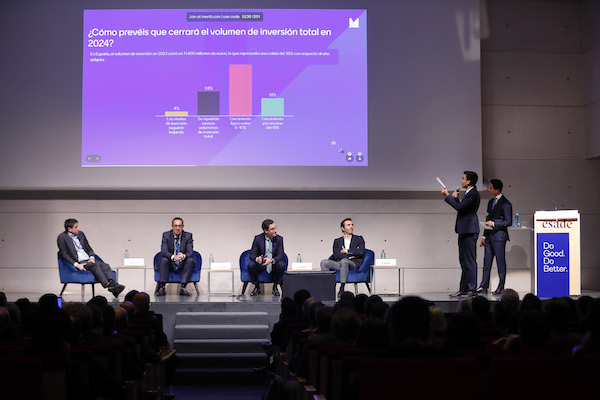
The next to take the stage were Hugo Soler-Duffo (BBA 25), a member of the Esade Student Finance Society, and Jaume Grané (BBA 25), president of the Esade Real Association, who surveyed the audience on their predictions for 2024, the most attractive alternative sectors for investment, the effects of artificial intelligence on investments, and the talent profile that companies are seeking the most. The results were analyzed by the experts.
To close the event, Enrique Martínez Laguna (MBA93), vice-chair of the Esade Alumni Real Estate Club and member of the Executive Committee of the Urban Land Institute (ULI), highlighted that the session’s twofold vision – financial and real estate – enabled real estate assets to be positioned as an important investment product. Martínez Laguna also valued the presence of Esade students at the event, stressing that the feedback between the business world and academia enables an exchange of knowledge with professionals in the sector, which enriches classroom learning, while companies, in turn, are fed by young talent.
You can see the full session at the Content Hub





